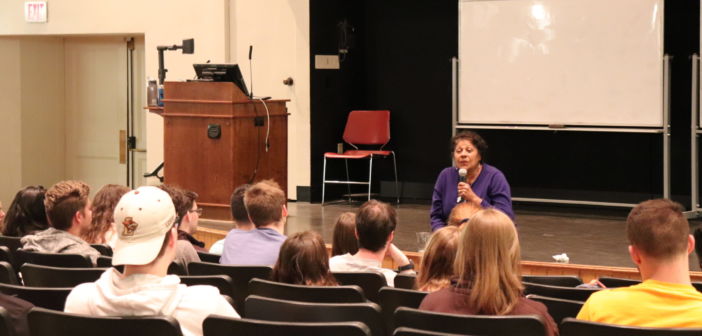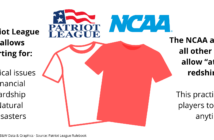Joan Duvall-Flynn, president of the NAACP’s Pennsylvania State Conference, spoke to students about the role that children and young adults have played throughout the organization’s history in a discussion organized by Lehigh’s Student Political Action Coalition, SPAC, on April 17.
“We need people who have dedicated their lives to political activism to really teach us so that we can become advocates,” said Chloe Sider, ’21, a SPAC representative and one of the event coordinators. “We want to show students that issues they are passionate about are worth their time, energy and advocacy.”
The NAACP, which stands for the National Association for the Advancement of Colored People, was founded in 1909 by a diverse group of individuals including Ida B. Wells and W.E.B. DuBois, with a mission “to secure the political, educational, social, and economic equality of rights in order to eliminate race-based discrimination,” according to NAACP’s website.
The organization does work on housing, education, health, political action and environmental justice, which are areas that have particular impact on people of color and the poor.
Duvall-Flynn said young people have been a valuable part of the NAACP since the 1950s. She cited the 1963 Children’s March in Birmingham, Alabama, where middle and high school students left school to march for civil rights.
“They broke the back of segregation in Alabama,” Duvall-Flynn said. “Children from all around Birmingham walked to the city for that protest … The children went into the park, and they were praying… (The police) turned the hoses on those kids, and the kids made a circle, linked arms and started laughing. That’s when (Eugene ‘Bull’) O’Connor said to the power structure, ‘that’s it, they’re not scared of us anymore.’”
O’Connor was the commissioner of public safety for the city of Birmingham at the time.
Duvall-Flynn encouraged greater awareness and advocacy for social justice issues from those who may not be directly affected by them. She acknowledged that for many, issues of inequality and injustice do not become a problem until someone close to them is affected.
“Everything that is wrong in society affects everyone,” Duvall-Flynn said. “If the laws aren’t fair, one day it’s going to be your spouse or your brother…that’s when it gets personal.”
Duvall-Flynn said she wants youth to reclaim their civic agency.
Students had the opportunity at the event to voice concerns about social justice issues plaguing society today and changes they would like to see or make.
“These are the conversations we need to be having right now,” said Jacques Pelman, ’22, an attendee. “I felt like the event was worth my time, and I would definitely go to something else like it.”
As president of NAACP, Duvall-Flynn is responsible for speaking on behalf of the Pennsylvania NAACP. She monitors the work of 14 statewide committees and meets with lawmakers in Harrisburg. She has been a lifelong member of the NAACP, joining her local branch when she was 9 years old. Duvall-Flynn represented her branch at the 1963 March on Washington.
“You will change the world, each one of you,” Duvall-Flynn said. “It’s not that hard…you do one good thing, and the entire world is better off.”






Comment policy
Comments posted to The Brown and White website are reviewed by a moderator before being approved. Incendiary speech or harassing language, including comments targeted at individuals, may be deemed unacceptable and not published. Spam and other soliciting will also be declined.
The Brown and White also reserves the right to not publish entirely anonymous comments.
1 Comment
As anyone living who attended a male only (undergraduate) Lehigh would know: Bull Connor
From Wikipedia, the free encyclopedia
Jump to navigationJump to search
Bull Connor
Bull Connor (1960).jpg
President of the Alabama Public Service Commission
In office
January 18, 1965 – January 17, 1972
Preceded by Jack Owen
Succeeded by Kenneth Hammond
Birmingham Commissioner of Public Safety
In office
1957–1963
Preceded by Robert Lindbergh
Succeeded by Position abolished
In office
1937–1952
Preceded by W. O. Downs
Succeeded by Robert Lindbergh
Member of the Alabama House of Representatives
In office
1935–1937
Personal details
Born Theophilus Eugene Connor
July 11, 1897
Selma, Alabama, U.S.
Died March 10, 1973 (aged 75)
Birmingham, Alabama, U.S.
Political party Democratic, States’ Rights Democratic
Spouse(s) Beara[1]
Children 2
Theophilus Eugene Connor (July 11, 1897 – March 10, 1973), known as Bull Connor, was an American politician who served as an elected Commissioner of Public Safety for the city of Birmingham, Alabama, for more than two decades. He strongly opposed activities of the American Civil Rights Movement in the 1960s. Under the city commission government, Connor had responsibility for administrative oversight of the Birmingham Fire Department and the Birmingham Police Department, which also had their own chiefs.
Connor enforced legal racial segregation and denied civil rights to black citizens, especially during the Southern Christian Leadership Conference’s Birmingham campaign of 1963. He became an international symbol of institutional racism. Bull Connor directed the use of fire hoses and police attack dogs against civil rights activists; child protestors were also subject to these attacks.[2][3] National media broadcast these tactics on national television, horrifying much of the nation. The outrages served as catalysts for major social and legal change in the Southern United States and contributed to passage by the United States Congress of the Civil Rights Act of 1964.[4]
Just don’t know how to make digital comments pretty. His parents seemed to have loved God but didn’t teach Bull to love his fellow man